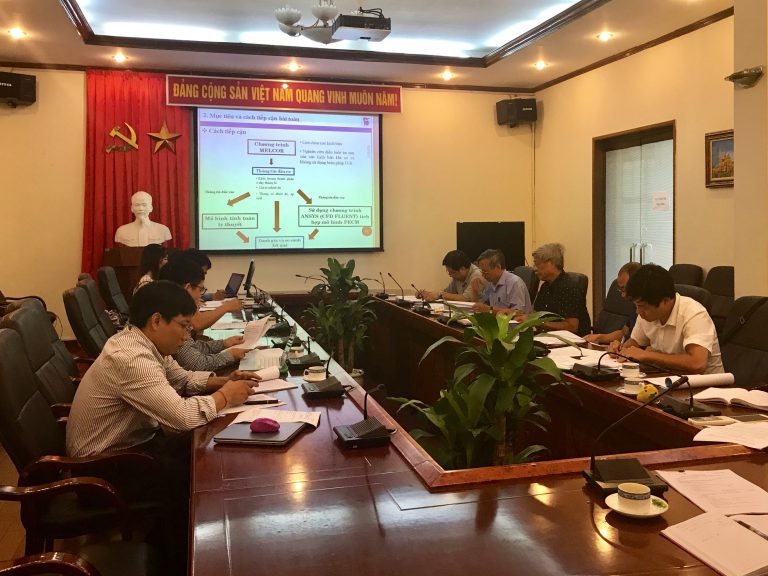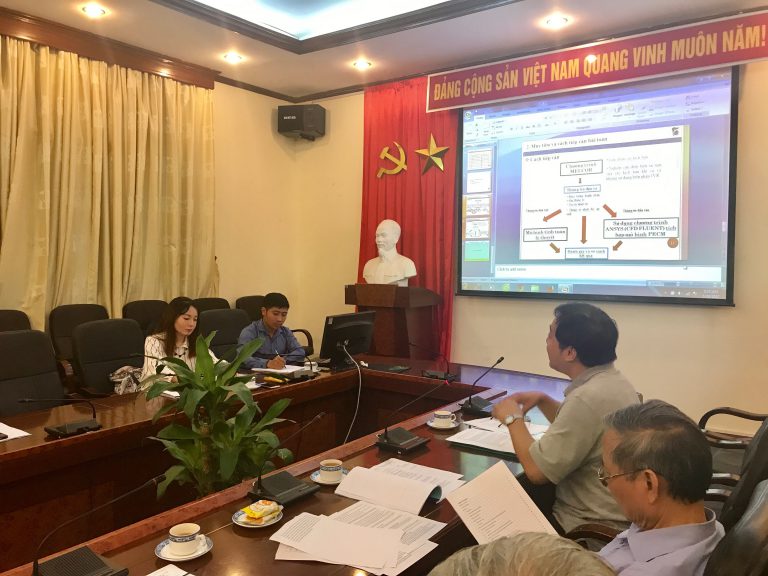On May 20th, 2017, at the headquarters of the Vietnam Atomic Energy Institute (VINATOM), the meeting of the Science and Technology Council was held to consider directly assigning Nuclear Training Center (NTC) the 2018 Ministerial-level research project “The study to calculate the applicability of In-vessel Melt Retention (IVMR) for the VVER-1000 reactor” led by MSc. DOAN Manh Long.
The meeting was attended by the Council, including PhD. LE Van Hong – Chairman, Assoc. Prof. HA Manh Thu – Vice Chairman, PhD. TRINH Cuong – Reviewer, PhD. PHAM Nhu Viet Ha – Reviewer, PhD. DUONG Thanh Tung – Member, PhD. NGUYEN Van Thai – Member, PhD. DOAN Quang Tuyen – Member; On the guest side were PhD. TRAN Chi Thanh – President of VINATOM, PhD. PHAM Ngoc Dong – Representative of NTC leaders, and other participants in the project.
To start the meeting, MSc. DOAN Manh Long presented the topic and approach to solve the problem. This project investigates the possibility of applying /In-Vessel Melt Retention (IVMR) through External Reactor Vessel Cooling (ERVC), referred to as IVR, for VVER-1000 nuclear reactor. The principle of IVR can be stated as follows. In case of severe accident, the reactor core is melt. The core melt relocates to lower plenum and threatens the integrity of lower head vessel. By injecting water to flood reactor pit in order to cool the core melt through external surface of lower head vessel appropriately, therefore, the integrity of lower head vessel will be maintained. IVR has been successfully applied as a severe accident management strategy for two concepts of nuclear reactor, such as VVER-440 and AP-600. Currently, this strategy has been being studied to adopt in higher power reactors such as AP1000, APR1400, VVER1000, etc. This is one of the research issues which attract a great deal of concern from research groups across the world.

The meeting among the Science and Technology Council, the project leader and other participants of the Ministerial-level research project
The IVR study encompasses a number of issues, however, these issues are grouped into three major mathematical problems: 1) Evaluate the impact of the molten debris on the lower head vessel (including thermal and mechanical impacts); 2) Evaluate the durability of the lower head under the impact of the molten debris (heat resistance and mechanical properties); 3) Evaluate the cooling capacity of ambient on external the lower head. Within the scope of the project, the team will conduct two major research topics: 1) Evaluate the thermal impact of the molten debris; 2) Evaluate the durability of lower head vessel under thermal load of molten debris the heat resistance of the lower head. In order to solve the problems, three approaches are used: 1) Use the severe accident modeling program MELCOR; 2) Use a theoretical analysis computing model; 3) Use the multi-environment simulation program ANSYS (CFD FLUENT) integrated with Phase-change Effective Convection Model (PECM).
The Council evaluates this as a research area of great interest throughout the world in recent years. In the present context, as China and other countries in the region continue to build new nuclear power plants, the development of manpower that is capable of analyzing and evaluating the evolution of severe accidents, is extremely urgent. Although Vietnam has halted nuclear power plant projects, nuclear safety analysis is of particular concern in the near future. Implementation of this research project will help us continue to maintain and update the status of research and development of nuclear power technology in the world. More importantly, it contributes to Vietnam’s nuclear capacity building and assures national autonomy in analyzing and assessing nuclear safety in the event of nuclear power plant incidents occurring in the regional and world-wide scales.
Recognizing that the participants of the research project are mostly at young age, PhD. Le Van Hong emphasized the importance of training and maintaining the personnel specialized in nuclear reactor technology. The implementation of this project are expected to make contribution to enhance the professionalism of research staff, train a team of researchers who will be ready and proactive in meeting the requirements of the country, and will be able to promptly approach the technology when Vietnam intends to resume nuclear power projects.
 The Reviewer gave feedback on Ministerial-level research project
The Reviewer gave feedback on Ministerial-level research project
Agreeing with the necessity of the above research topic, seven out of seven Council members voted on the implementation of the project at total score of 80.14/100. The project will soon be launched in the coming time, promising to be an in-depth study of the severe accident occurring inside the reactor vessel.
PHAM Thi Thu Trang, MA. – Nuclear Training Center
